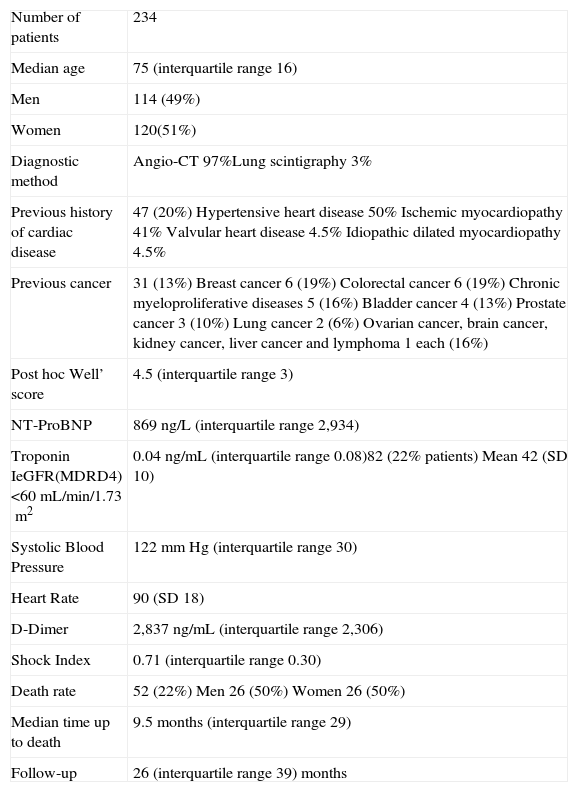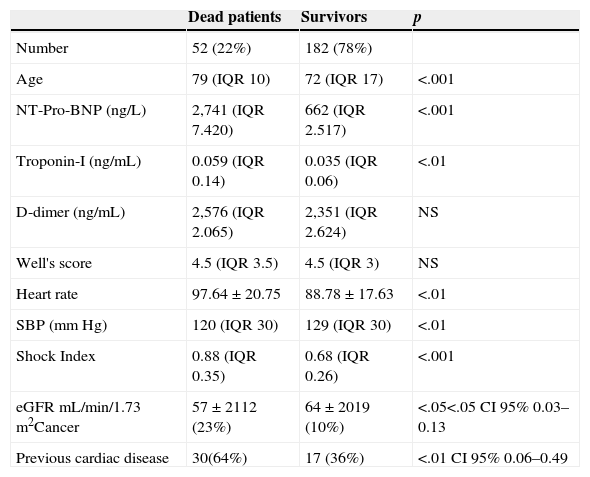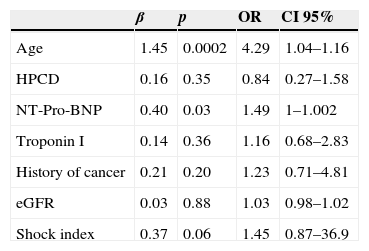After an acute pulmonary embolism few long-term prognostic factors have shown to be of practical use. We hypothesized that, as in heart failure, natriuretic peptides could serve as biomarkers of a late deleterious prognosis.
Patients and methodsConsecutive patients admitted to an Internal Medicine ward diagnosed with acute pulmonary embolism were traced through the computerized system of clinical episodes of Navarra Health System and by telephone calls. On hospitalization, standard evaluation was made, previous history of cancer and cardiac disease was recorded, and N-terminal ProB-type natriuretic peptide (NT-ProBNP), D-dimer and Troponin I were measured. In the analysis all-causes death was considered.
ResultsTwo hundred and thirty-four patients were traced, median age 75 [interquartile range (IQR) 16] years old, women 51%. At a median time of 9.5 (IQR 29) months 52 (22%) patients had died, 38 (73%) dead patients had NT-ProBNP higher than 850ng/L. NT-ProBNP in dead patients was 2.741 (IQR 7.420)ng/L and 662 (IQR 2.517)ng/L in survivors (p<0.001). Age (OR 4.37 CI 95% 1.04–1.16) and NT-ProBNP (OR 1.49 CI 95% 1–1.002) showed to be independent factors of mortality. Between the 3rd and 20th month after the diagnosis, a level of NT-ProBNP higher than 850ng/L (sensitivity 0.86, specificity 0.45 and negative predictive value 0.92) was associated with a lower survival (p=0.019), hazard ratio 1.89, OR 7.67 (CI 95% 1.52–39.44) for this period.
ConclusionBesides the unchangeable age, plasma level of NT-ProBNP measured on acute pulmonary embolism could predict longer-term all-cause death.
Pocos factores pronósticos se han mostrado útiles a largo plazo después de un tromboembolismo pulmonar agudo. Este estudio se realizó sobre la hipótesis de que, al igual que sucede en la insuficiencia cardiaca, los péptidos natriuréticos podrían ser útiles como biomarcadores de pronóstico adverso tardío.
Pacientes y métodosCon la ayuda del sistema informático de episodios clínicos del Sistema de Salud de Navarra y mediante llamadas telefónicas, identificamos los pacientes consecutivos ingresados en una unidad de Medicina Interna que habían sido diagnosticados de tromboembolismo pulmonar agudo. Se realizó una evaluación estándar del episodio de hospitalización y registramos los antecedentes de cáncer y cardiopatía. Asimismo, medimos los niveles de péptido natriurético NT-pro-BNP, troponina I y dímero D. Se realizó un análisis de mortalidad por todas las causas.
ResultadosIdentificamos 234 pacientes con una edad mediana de 75 (rango intercuartílico [RIC] 16) años, y un 51% de mujeres. Después de un período mediano de 9,5 (RIC 29) meses, 52 (22%) pacientes habían fallecido; 38 (73%) pacientes fallecidos tenían un nivel de péptido natriurético NT-pro-BNP superior a 850ng/l. El nivel de péptido natriurético NT-pro-BNP en los pacientes fallecidos fue de 2.741 (RIC 7.420) ng/l, mientras que en los que no habían fallecido este fue de 662 (RIC 2.517) ng/l (p<0,001). La edad (OR 4,37, IC 95% 1,04-1,16) y el péptido natriurético NT-pro-BNP (OR 1,49, IC 95% 1-1.002) fueron factores independientes de mortalidad. Entre los 3 y 20 meses después del diagnóstico, un nivel de péptido natriurético NT-pro-BNP superior a 850ng/l (sensibilidad 0,86, especificidad 0,45 y valor predictivo negativo 0,92) se asoció a una menor supervivencia (p=0,019), con una razón de riesgo de 1,89 y una OR de 7,67 (IC 95% 1,52-39,44) durante este período.
ConclusiónAdemás de la edad, el nivel plasmático de péptido natriurético NT-pro-BNP determinado durante un tromboembolismo pulmonar agudo puede comportarse como un factor predictivo a largo plazo de mortalidad por todas las causas.












